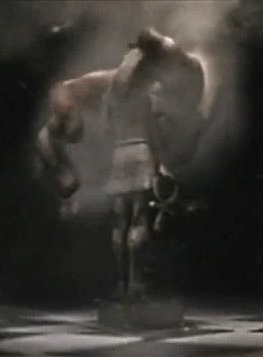The Spanish station Cuatro, which ran the hauntingly beautiful chess-themed LOST Season 6 promo, announced a contest earlier today based on that promo.
Here’s my translation of what Cuatro posted on its site, done with my semi-remembered high school/college Spanish, with a lot of help from Google Translate. It may not be 100% accurate, but I think it’s close enough:
Carlton Cuse, the creator and writer of LOST, just sent a Twitter message saying that the promo Cuatro made for the final season of the series is the best LOST promo he has seen.
We propose a game based on the promo. The original text was not written by Cuatro. Can you tell us who the author is and what work it is from? Answer the question here, and get a photo signed by the stars of the series. The first person with the correct answer will get the prize.
To participate in the contest, you must be registered on the Cuatro site with your full name, address, phone, and email.
At the time I saw this post on the Cuatro site, there were already 11 pages of answers! It’s too late to win, but if you are playing along at home, the answer is below:
It’s an adaptation of a verse from the Rubaiyat by Omar Khayyam.
Here are two translations of the Rubaiyat verse. The first is by Edward Henry Whinfield:
We are but chessmen, destined, it is plain,
That great chess-player, Heaven, to entertain;
It moves us on life’s chess-board to and fro,
And then in death’s dark box shuts up again.
The second is by Edward FitzGerald :
‘Tis all a Chequer-board of Nights and Days
Where Destiny with Men for Pieces plays:
Hither and thither moves, and mates, and slays,
And one by one back in the Closet lays.
From Rubaiyat translation, verse 270
Jorge Luis Borges wrote a poem, Chess, that comments on the verse above:
Faint-hearted king, sly bishop, ruthless queen,
Straightforward castle, and deceitful pawn –
Over the checkered black and white terrain
They seek out and begin their armed campaign.They do not know it is the player’s hand
That dominates and guides their destiny.
They do not know an adamantine fate
Controls their will and lays the battle plan.The player too is captive of caprice
(The words are Omar’s) on another ground
Where black nights alternate with whiter days.God moves the players, he in turn the piece.
But what god beyond God begins the round
Of dust and time and sleep and agonies?
That last verse in the Borges poem may have a particularly strong connection to LOST. When I watched the scene in the Season 5 finale with Jacob and the Man in Black (unofficially dubbed “Esau”), I thought about the possibility of there being unseen god-like powers beyond the god-like powers we had already seen. Here’s what I wrote on this blog back in May:
When we saw Ben and Widmore last season, they were the most powerful forces we had seen up to that point, appearing to control, between the two of them, almost everything that happened on the Island.
This season, it was as if a camera had pulled back and given us a wider shot, showing us the forces behind Ben and Widmore, forces even more powerful than they are. Jacob and Esau are now the most powerful people we have ever seen on the show.
But even Jacob and Esau cannot do everything they want. So there is someone or something powerful enough to make and enforce the rules that limit what Jacob and Esau can do. It may be a law of nature, it may be a person or group of people, it may be a supernatural force or being.
Perhaps next season, after we find out who or what it is, we will discover that it’s just another intermediate layer, and the camera will pull back yet again, to reveal the power behind the power behind the power
— from Who makes the rules? Esau is to Jacob as Ben is to Widmore
And so we head into Season 6, soon to find the answers to the great LOST questions. For the LOST-ies, is free will an illusion? If an unseen hand is moving them around the chessboard of time and place, what is that hand, and who or what, in turn, moves the hand that moves the LOST-ies across the board? And who or what moves the mover of the hand?











This makes my head spin…but I really, really love it. So excited for February 2.
Thanks. There’s not *too* much longer to wait …
Really enjoyed your post–thanks for putting the answer up! However, your post lists the Spanish station as Cuarto, when it’s Cuatro. (One of the numbers!)
Thanks for catching that! I made the change.
Cuarto means room in Spanish
Ha — I think I’m a tad dyslexic in all languages.
dont worry, it also means fourth: 4th position, 1/4 of something…
Thank you Ms Terri. Most of the time I am lost while enjoying Lost.
Thanx for your wonderful analysis, it is really enlightening !
Judy and Nectaria — thanks so much. This was a fun post to write.
There isn’t a single episode last season that didn’t give me goosebumps when I was watching. The Cuatro Promo has taken the entire mythology of Lost to another level. Hail the Smoke Monster! Great post MS Terri.
Thanks Viral K, and yes, all hail the Smoke Monster! As for goosebumps, I’m thinking/hoping that Season 6 is going to be the goosebumpiest yet.
———–
Meanwhile, it looks like my 15 minutes of blog fame are starting to wind down. Many thanks to Doc Jensen for the ride.
I don’t think it is accurate to say that Jacob is limited. There is no evidence yet that Jacob has limits. We know the “nemesis” Esau has limits but not Jacob. Even though Jacob gets killed by Ben, he could have allowed that to happen for a greater purpose, hence Christ’s sacrifice. This is a great analysis but I think the battle between Jacob and Nemesis is the two great powers over everything and Jacob is clearly the greater power.
That’s a great point! We have been shown explicitly that Esau has limits, because he needs a loophole to do what he wants to do — kill Jacob. We’ve seen no comparably clear-cut limitations placed on Jacob.
But I would say that arguably, at least, Jacob does have limits. He keeps on bringing different groups to the Island — and all they do is fight, destroy, and corrupt. Jacob says this will all work out in the end. But why does he have to keep on bringing in groups that fail? If he truly had no limits on his powers, why not just get it done (whatever “it” might turn out to be) right in the first place?
And then, as you bring up, there is the question of Jacob’s death. (That is, if he is *really* dead. I guess we’ll have to wait till next season to find that out. )
Here’s the thing that most intrigues me about the scene with Jacob and Esau. When Esau says (in an oddly gentle, apologetic tone, and calling Jacob “my friend”) that one day he will kill Jacob, Jacob doesn’t seem to mind. It’s such a strange interaction, and raises many questions.
It might suggest, as you say, that Jacob’s death was a Christ-like sacrifice, something Jacob knew was necessary and inevitable. That would explain why he didn’t seem to mind, in the scene with Esau on the beach.
My guess — and this is strictly a hunch — is that Jacob won’t turn out to be such an explicitly Christ-like figure. If he were, that would turn the whole LOST story into basically a Christian allegory, and I don’t think that’s going to happen. Not that it couldn’t, and not that it wouldn’t make sense, but there are so many different religions and philosophies swirling around in the show that I don’t think that the story is going to end up being primarily about any single one of them.
Thanks, Justin, for the thought-provoking comment!
Very good points Ms Terri. Jacob does have to continue to bring groups of people to the island and they do keep failing but this could be because of human failure and not Jacob’s. If the God = Jacob theory is correct than it is the age old problem of evil where God allows it but could stop it anytime. I also agree that the Lost story will not turn out to be an explicitly Christian allegory, but Christianity is by far the most referenced and alluded to religion during the first 5 seasons. I hope it will be like The Matrix where Neo is a Christ like figure who dies and rises again to save the world, but there is still enough other philosophies and religions mixed in so it is not as direct.
Do you think that Nemesis/Esau is the Smoke Monster? I think the most compelling argument for this is when Ben summons the Smoke Monster he tells Sun that she better go inside because what is about to come out of the jungle he can’t control. Then Nemesis Locke comes out. Thanks for insights!
Hi Justin. I have a theory that I’ve been mulling over for a while, that Jacob is being punished for some horrible daddy-issue-related crime (perhaps patricide, or killing his own children) which he committed many centuries ago, and that he has been banished to the Island until he atones. And that the way for him to atone is to be the catalyst that causes a group of people to resolve their own daddy issues and crimes. And each group he brings doesn’t quite make it, but gets closer — which explains the “progress” he mentions to Esau — until our very own group of Lost-ies, who seem to be quite good at resolving their daddy issues while on the Island.
I think your Jacob=God theory might be a better fit. For one thing, it accounts for Jacob being able to leave the Island, which my Jacob=Prisoner theory does not. But the Jacob=Prisoner theory puts daddy issues at the center of everything, which I think is where they belong.
Maybe the actual resolution of the show will somehow use elements of BOTH theories. The main Bad Daddy of them all being named Christian Shephard suggests that both themes — bad daddies and Christ-like sacrifices — might come together at the end.
As for the smoke monster, I’ve been thinking that maybe the smoke monster is something that exists in some kind of time hole, where it exists in all different times at once. So, just as someone moving fast might look like a blur to someone standing still, the smoke monster, which might actually be something solid, looks like smoke to someone who is anchored in a specific time.
I have no opinion on whether the monster might be Nemesis/Esau. I’ve been thinking, though, that maybe Esau really isn’t a nemesis — maybe he’s really not Jacob’s enemy.
Thanks for the interesting discussion!